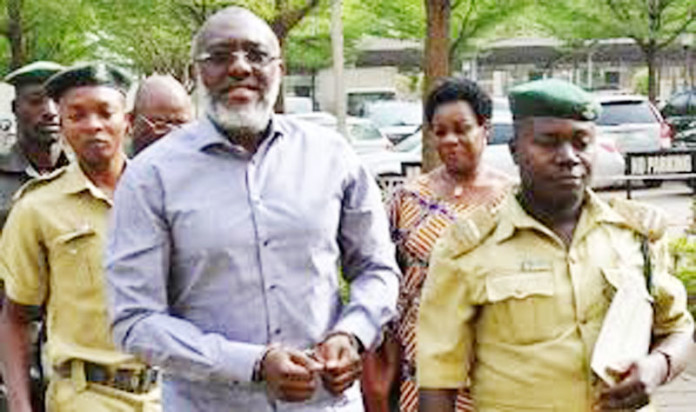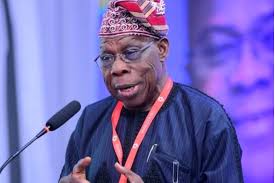*Got N400m through e-payment to his company
*EFCC tenders three sets of evidence against Metuh
The trial of Chief Olisa Metuh, the National Publicity Secretary of Peoples Democratic Party (PDP) continued Tuesday with a senior official from the Office of the National Security Adviser (ONSA), Mr. Baleh Ndam telling the Federal High Court, Abuja, that Metuh’s firm, Destra Investments Ltd, was among 78 beneficiaries of fraudulent payment from the ONSA without executing any contract.
Ndam, who testified before trial judge, Justice Okon Abang, added that the N400million electronically wired into the defendant’s company account amounted to fraudulent payment for a non-existent contract.
Ndam is the third witness the Economic and Financial Crimes Commission (EFCC) brought to testify against the PDP spokesman, who, alongside his firm, is answering to a seven-count criminal charge bordering on criminal breach of trust and illegal diversion of public funds to the tune of N400 million.
In his testimony the witness told the court that since 2012 when he started working in the Legal Department of the ONSA, he never came across or prepared any contract of any nature between the ONSA and Destra Investments Ltd which is the 2nd defendant in the matter.
Led in evidence by EFCC lawyer Sylvanus Tahir, the witness said: “My Lord, I am a civil servant in the Legal Department of the Office of the National Security Adviser, ONSA. I have been working there since 2012.
“My duties include vetting and drafting contracts and memorandum of understanding, among other things. I don’t know Metuh personally and I have not in my official capacity known or heard about Destra Investment Ltd.
“I worked under Major-General Muhktar, Gen Aliyu Gusau, Gen Azazi and later, Col. Sambo Dasuki. On November 28, 2015, the ONSA forwarded a letter to the chairman of EFCC titled, ‘Payment for contract without award’ for necessary action.
“The letter forwarded the list of companies and individuals numbering 78 and Destra Investments Ltd was one of them.
“Following the letter, the EFCC sent a letter to the ONSA requesting for e-payment mandates of these companies. The letter which was sent to the Office of the NSA on January 13, 2016, was signed by one Ibrahim Musa, Head of the STF unit of the EFCC.
“The ONSA replied to the request of the EFCC, forwarding the list of e-payment mandates No. 0799 to the EFCC on January 14, 2016. The reply was signed by M. Abdulrahim, a Group Captain. After the letter was forwarded to the EFCC, I was also invited to write a statement, which I did.”
The witness disclosed that the petition from the ONSA to the EFCC was signed by Lt. Col. Ibrahim A. A, who he identified as Special Adviser to the NSA.
Metuh objects to sets of evidence
Meanwhile, Metuh’s lawyer, Dr. Onyechi Ikpeazu, SAN, objected to the admissibility of three sets of documents the EFCC wanted to tender in evidence through the witness.
The documents included the petition captioned, “Payment To Companies With No Contract Awards and Approval”; a letter by the EFCC requesting details of payments made to Metuh’s firm, Destra Investments Limited, and a reply to the EFCC letter which contained the e-payment mandate for the N400m.
Metuh’s lawyer contended that the petition from the ONSA was not the same letter the witness said was captioned “Payment of contract without Awards”.
He said: “Secondly, this witness identified A.A. Ibrahim as the maker of this document. This witness, who is Mr. Baleh Ndam, is not the maker.
“The essence of tendering documents through the maker is for such person to be cross-examined. This witness, not being the custodian of any of the documents, cannot be cross-examined with regard to the contents,” Ikpeazu argued.
He noted that the documents sought to be tendered were procured and certified by EFCC and not the witness. Relying on Section 84 of the Evidence Act and decided case-law in Bamaiyi vs AGF, 2001, Metuh’s lawyer also argued that the said e-payment mandate, being a computer-generated document, could not be admitted by the court.
He said: “The e-payment mandate, as an electronically generated document, must satisfy provisions of Section 84(4) (a) (b) and (c) of the Evidence Act. More so, as evidence of electronic transaction, the document must be accompanied with a certificate as stipulated in the Evidence Act.”
However, EFCC persuaded the court to discountenance arguments by Metuh’s lawyer which it said were “highly misconceived.”
The prosecuting counsel, Mr. Tahir, maintained that all the documents were very relevant to the trial of the accused person.
“My Lord, notice of the documents was given to the defendant by virtue of the proof of evidence already front-loaded before this court. We urge your Lordship to dwell on the substance of the matter rather than on technicalities.
“The PW-3 is only a public officer who is representing his organisation which is the ONSA. Notwithstanding that the maker of the documents has not been called, the admissibility is at the discretion of the court,” Tahir argued.
He also relied on Section 83(2) of the Evidence Act to insist that the court ought to admit the documents into evidence, owing to its relevance to the trial. He said the exhibits did not fall within the purview of those envisaged in Section 84 of the Evidence Act.”
Court admits documents as exhibits
Delivering a Bench ruling on the matter, Justice Abang upheld arguments by the prosecution, stressing that EFCC had a right to tender the documents through the witness who is also an official of the Federal Government.
He held that both the EFCC and ONSA represent the interest of the Federal Government which is prosecuting the case, stressing that not every public document in custody of a public officer required certification before it could be admitted into evidence.
“It is my humble view that the e-payment schedule is a mere annexure to the letter addressed to the EFCC and, therefore, does not require any certification”, the Judge held, adding that the fact that the witness wrongly identified the heading of the letter did not affect its relevance to the trial.
Consequently, the court admitted and marked the three sets of documents as Exhibits A, B and C.
In continuation of his testimony, the witness told the court that the document tendered indicated that the N400m was paid into Metuh’s company for security services.
He said: “My Lord, our Legal Department has not prepared any contract of any nature between ONSA and Destra Investments Ltd.
“In 2015, I remember that I vetted two contracts by ONSA. However, I cannot state the total number of contracts that were vetted by the Legal Department because I am not the only lawyer in the department.”
Under cross-examination, the witness said the documents stated that all due process was complied with in the process that led to the electronic transfer of the fund to Metuh’s firm.
He told the court that it was the Department of Administration & Finance that was responsible for payment of contract costs, saying “besides the award of contracts, ONSA is also involved in security issues.”
Confronted with one of the documents tendered before the court, the witness admitted that Metuh’s firm was awarded contract to purchase three operational vehicles for ONSA.
He said it was not in his capacity to know whether Destra Investments Limited was notified when the N400m was transferred into its account by ONSA or whether or not it received an alert from its financial institution, Diamond Bank Plc when the money was paid into the account.
The witness also told the court that he had never come across any correspondence between the office of the NSA and Metuh’s firm in respect of the N400 million, noting that before payment could be made by the ONSA, it must be approved by the NSA.
“At the time the transaction took place, Col S. M. Dasuki was the one in charge of approval. The NSA is the sole administrator with respect to activities of the ONSA and he is answerable to the President. I am not aware if the ONSA has more than one account at the CBN,” the witness added.
Nevertheless, defence lawyer, Ikpeazu, alleged that the witness was procured by EFCC to indict Metuh.
Ikpeazu told the court that the PW-3 was summoned to make statement at the EFCC on January 21, after the case against his client was already fixed for hearing. Justice Abang has, however, adjourned the case till today to hear Metuh’s application for variation of his bail and for continuation of trial.
Metuh’s lawyer confirms receipt of 200-page proof of evidence
Metuh’s lawyer had confirmed that the EFCC served him with a 200-page additional proof of evidence, a document he said he would discuss with the defendant.
It would be recalled that two witnesses of the EFCC, Nneka Ararume and Sie Iyenome, narrated how they helped the accused person change and transferred $2 million into his company’s account.
Whereas Ararume is a Wealth Manager at Assets & Resources Management (ARM), a company that hitherto managed the asset portfolio of Metuh’s firm, the PW-2 is a Bureau-de-Change operator.
EFCC had alleged that the N400m was withdrawn from an account ONSA operated with the Central Bank of Nigeria (CBN), and transferred it to Metuh through account no. 0040437573, which Dextra Investments Limited operated with Diamond Bank Plc.
EFCC insisted that though the fund was earmarked for campaign activities of the PDP, Metuh diverted most of it for his personal use.
It alleged that Metuh converted part of the money to $1 million which he used for his personal business. Besides, Metuh was alleged to have transferred N21.7m to another chieftain of the PDP, Chief Tony Anenih.
Trial continues Wednesday.
-Vanguard













